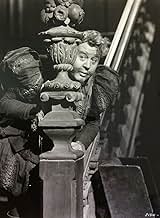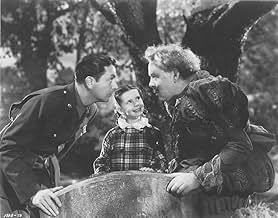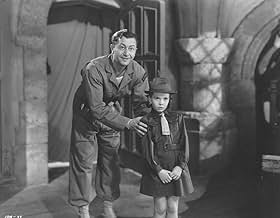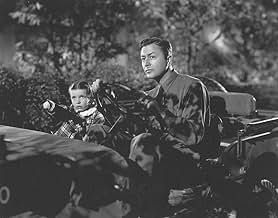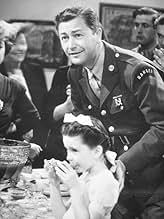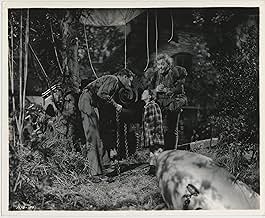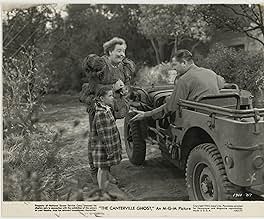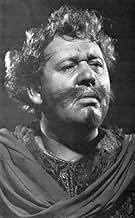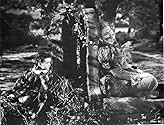IMDb RATING
6.9/10
3.5K
YOUR RATING
The descendent of a ghost imprisoned for cowardice hopes to free the spirit by displaying courage when under duress.The descendent of a ghost imprisoned for cowardice hopes to free the spirit by displaying courage when under duress.The descendent of a ghost imprisoned for cowardice hopes to free the spirit by displaying courage when under duress.
- Directors
- Writers
- Stars
- Awards
- 1 win total
Rags Ragland
- Big Harry
- (as 'Rags' Ragland)
Harry Allen
- Mr. Cawthorne at Party
- (uncredited)
- Directors
- Writers
- All cast & crew
- Production, box office & more at IMDbPro
Featured reviews
Sir Simon of Canterville gets roped into fighting a duel for his cousin, realising he faces certain death he flees the field awash with cowardice. His father is so enraged as to this stain on the family honour - he walls Simon up in the castle without food and water until death does strike him down. He is doomed to haunt the Canterville castle until a fellow member of the family can commit an act of bravery and thus lift the cowardly stain that has besmirched the Canterville name.
Doesn't sound much like a comedy does it!, but it is, and a very amiable one at that. Loosely based on Oscar Wilde's story of the same name, The Canterville Ghost benefits from a couple of charming performances from Charles Laughton as Simon, and from a young Margaret O'Brien as Lady Jessica de Canterville. Laughton is clearly enjoying himself as the ghost, heavy on the "woe is me" theatrics coupled with gusto comedy, it's a very enjoyable performance from the big man. O'Brien is here enjoying being the center of attention and she positively lights up every scene she is in with youthful exuberance. The story follows a well trodden path to the rewarding ending, but it's a fun ride getting there regardless. Things really pick up a pace once a platoon of American soldiers are billeted at the castle and we are introduced to Cuffy Williams (Robert Young), a descendant Canterville of course, but he himself is showing a line in cowardice, so we are then left wondering if Cuffy can indeed show bravery and thus free Simon from his ghostly duties?. 7/10
Doesn't sound much like a comedy does it!, but it is, and a very amiable one at that. Loosely based on Oscar Wilde's story of the same name, The Canterville Ghost benefits from a couple of charming performances from Charles Laughton as Simon, and from a young Margaret O'Brien as Lady Jessica de Canterville. Laughton is clearly enjoying himself as the ghost, heavy on the "woe is me" theatrics coupled with gusto comedy, it's a very enjoyable performance from the big man. O'Brien is here enjoying being the center of attention and she positively lights up every scene she is in with youthful exuberance. The story follows a well trodden path to the rewarding ending, but it's a fun ride getting there regardless. Things really pick up a pace once a platoon of American soldiers are billeted at the castle and we are introduced to Cuffy Williams (Robert Young), a descendant Canterville of course, but he himself is showing a line in cowardice, so we are then left wondering if Cuffy can indeed show bravery and thus free Simon from his ghostly duties?. 7/10
This, the first film version of Oscar Wilde's short story "The Canterville Ghost", was made by M-G-M during World War II, and, like some other films of that period based on literary or theatrical works, tries to incorporate some good old American (and British) flag-waving into its charming original story, which, as in all the TV versions (this is the only theatrical one) updates it to the twentieth century; when will someone do a good film version of the story in its original, nineteenth-century setting?
Fortunately, the story isn't tampered with enough to ruin it, and one of the film's virtues is Charles Laughton in the title role.
Proving what a great actor can bring to an average screenplay, Laughton hams it up outrageously in his comical first scene, in which his character, Sir Simon de Canterville, is still alive, but he later shows a deep sensitivity in the later scenes in which he expresses terror during his murder and quiet despair at his fate.
In order to incorporate some war heroics, a platoon of American soldiers has been incorporated into the story, and Laughton's descendant (Robert Young) must perform a heroic deed in order to break the curse that Laughton has been placed under. Some rather broad serviceman comedy has been incorporated into the story as well, courtesy of "Rags" Ragland and Frank Faylen (Dobie Gillis's dad on the TV series). It is Faylen who gets to deliver the film's most topical line--not having seen the ghost yet, he asks his fearful platoon, "What are you going to do when you have to face Nazis?" (What would Oscar Wilde have thought?)
Robert Young is his usual pleasant self as Laughton's descendant, and child star Margaret O'Brien isn't nearly as revoltingly syrupy as you might fear.
But it is Laughton's way with both sentiment and comedy that really makes the film worth watching, and it is worth watching.
Fortunately, the story isn't tampered with enough to ruin it, and one of the film's virtues is Charles Laughton in the title role.
Proving what a great actor can bring to an average screenplay, Laughton hams it up outrageously in his comical first scene, in which his character, Sir Simon de Canterville, is still alive, but he later shows a deep sensitivity in the later scenes in which he expresses terror during his murder and quiet despair at his fate.
In order to incorporate some war heroics, a platoon of American soldiers has been incorporated into the story, and Laughton's descendant (Robert Young) must perform a heroic deed in order to break the curse that Laughton has been placed under. Some rather broad serviceman comedy has been incorporated into the story as well, courtesy of "Rags" Ragland and Frank Faylen (Dobie Gillis's dad on the TV series). It is Faylen who gets to deliver the film's most topical line--not having seen the ghost yet, he asks his fearful platoon, "What are you going to do when you have to face Nazis?" (What would Oscar Wilde have thought?)
Robert Young is his usual pleasant self as Laughton's descendant, and child star Margaret O'Brien isn't nearly as revoltingly syrupy as you might fear.
But it is Laughton's way with both sentiment and comedy that really makes the film worth watching, and it is worth watching.
Charles Laughton who made a career of playing tortured and twisted men goes one better here as Sir Simon de Canterville who haunts stately Canterville Manor until another Canterville performs a heroic deed and frees him from being earthbound.
The first part of the film shows the incident where Sir Simon turns tail and runs from a duel he got involved in. Out of shame and embarrassment, his father bricked him up in a room in the manor and pronounced the aforementioned curse upon him.
Breaking that curse is easier said than done because the cowardice was passed down several generations from Stuart England to World War II.
Enter a platoon of American rangers quartered at the manor house where the current lady of the manor, Margaret O'Brien is like so many in Great Britain in those years, playing host to American GIs. One in that platoon is a distant cousin from America, Robert Young. Will he perform the deed that frees Charles Laughton? Watch the film and find out.
Robert Young and Margaret O'Brien are fine, but it is the multi-talented Mr. Laughton who carries this film. This is a difficult part and only an actor of real talent and skill could carry it off. The comic elements are nicely done, but Laughton also has to project an air of resigned sadness at the fate he's been cursed with. And Mr. Laughton bares the tortured soul of Simon de Canterville for all to see.
This is a story originally written by Oscar Wilde and nicely updated for World War II moviegoers. And it's still a fine piece of film making for today's audience.
The first part of the film shows the incident where Sir Simon turns tail and runs from a duel he got involved in. Out of shame and embarrassment, his father bricked him up in a room in the manor and pronounced the aforementioned curse upon him.
Breaking that curse is easier said than done because the cowardice was passed down several generations from Stuart England to World War II.
Enter a platoon of American rangers quartered at the manor house where the current lady of the manor, Margaret O'Brien is like so many in Great Britain in those years, playing host to American GIs. One in that platoon is a distant cousin from America, Robert Young. Will he perform the deed that frees Charles Laughton? Watch the film and find out.
Robert Young and Margaret O'Brien are fine, but it is the multi-talented Mr. Laughton who carries this film. This is a difficult part and only an actor of real talent and skill could carry it off. The comic elements are nicely done, but Laughton also has to project an air of resigned sadness at the fate he's been cursed with. And Mr. Laughton bares the tortured soul of Simon de Canterville for all to see.
This is a story originally written by Oscar Wilde and nicely updated for World War II moviegoers. And it's still a fine piece of film making for today's audience.
Jules Dassin directed this adaptation of Oscar Wilde's story, a charming fantasy about the ghost of a coward haunting an English castle, aided by a relative who must perform a heroic deed to save the spirit from eternal misery. Despite a reportedly troubled production, the cast (including big scene-stealer Charles Laughton and little scene-stealer Margaret O'Brien) glides through it blithely, and Dassin's handling of the material is efficient, if perhaps a tad colorless. Robert Young and Peter Lawford are interchangeably bland, but there are some pleasurable moments. Perhaps not the most memorable apparition-laden comedy, but an enjoyable entry in the genre. **1/2 from ****
Very, very loosely based on a short story by Oscar Wilde--so loosely that he is probably turning in his grave--THE CANTERVILLE GHOST is a charming bit of 1940s Hollywood fluff about an English ghost who runs afoul of American pragmatism. In the film version, the Americans arrive in the form of WWII soldiers, including Robert Young, who are billeted at a notoriously haunted castle where they encounter a legendary spectre much given to theatrical materializations.
Although the story is very, very slight, the cast makes it enjoyable. Child star Margaret O'Brien gives a typically enjoyable performance as the unwilling heiress to the castle, and Robert Young and his fellow actors mug their way through the script with entertaining aplomb. The greatest pleasure, however, is Charles Laughton as the ghost, which he plays most delightfully. The emphasis is on comedy rather than ghostly thrills, and although the comedy is quite mild it is expertly done. THE CANTERVILLE GHOST will never make any one's short list of "great cinematic art," but both grown-ups and kids alike will have a good time with it; recommended for an old fashioned family night.
Gary F. Taylor, aka GFT, Amazon Reviewer
Although the story is very, very slight, the cast makes it enjoyable. Child star Margaret O'Brien gives a typically enjoyable performance as the unwilling heiress to the castle, and Robert Young and his fellow actors mug their way through the script with entertaining aplomb. The greatest pleasure, however, is Charles Laughton as the ghost, which he plays most delightfully. The emphasis is on comedy rather than ghostly thrills, and although the comedy is quite mild it is expertly done. THE CANTERVILLE GHOST will never make any one's short list of "great cinematic art," but both grown-ups and kids alike will have a good time with it; recommended for an old fashioned family night.
Gary F. Taylor, aka GFT, Amazon Reviewer
Did you know
- TriviaThe bomb that Cuffy and the ghost want to dispose of was known as a "blockbuster", so-called because it was so powerful it could demolish more than a dozen buildings i.e. a city block.
- GoofsWhile many German parachute mines with time delay dropped on England during World War II; but they weren't called blockbusters. The blockbuster was a type of bomb devised by the British. At first a blockbuster was a four thousand pound bomb; but later became an 8000 and then a 12000 pound bomb. They achieved these sizes by simply bolting two or three of the 4000 pounders together. They were called Blockbusters because it was calculated that they could destroy a city block.
- Quotes
Sir Simon de Canterville: Excuse me, I really must gibber at the oriole window.
- ConnectionsFeatured in Cineficción Radio: Lo fantástico (2020)
- SoundtracksBless 'em All
(uncredited)
Written by Fred Godfrey (1917)
Revised lyrics by Jimmy Hughes and Frank Lake (1940)
Additional lyrics by Al Stillman (1941)
Sung a cappella by the soldiers
- How long is The Canterville Ghost?Powered by Alexa
Details
- Release date
- Country of origin
- Language
- Also known as
- El fantasma de Canterville
- Filming locations
- Production company
- See more company credits at IMDbPro
- Runtime
- 1h 35m(95 min)
- Color
- Aspect ratio
- 1.37 : 1
Contribute to this page
Suggest an edit or add missing content



